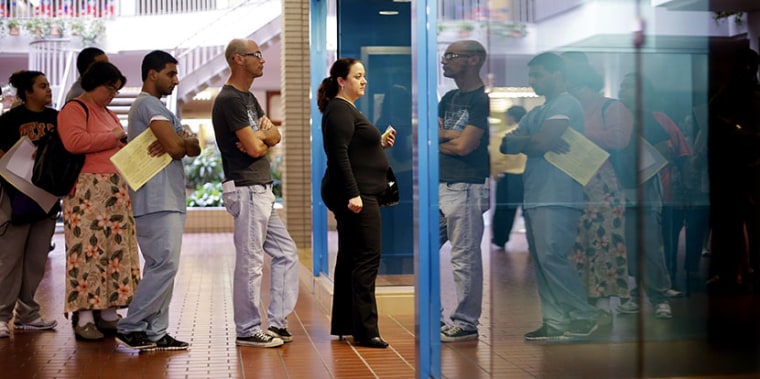The U.S. Justice Department will file suit to require Texas to continue pre-clearing changes to its voting system, Attorney General Eric Holder said Thursday morning.
"Today I am announcing that the Justice Department will ask a federal court in Texas to subject the State of Texas to a pre-clearance regime similar to the one required by Section 5 of the Voting Rights Act," Holder said in a speech to the National Urban League in Philadelphia.
As Holder noted, when a state has a history of discrimination in voting, the Voting Rights Act allows the federal government to request that it be "bailed in" to the pre-clearance regime, under Section 3 of the law. The Supreme Court last month effectively invalidated Section 5, but left Section 3 in tact.
"Based on the evidence of intentional racial discrimination that was presented last year in the redistricting case, Texas v. Holder—as well as the history of pervasive voting-related discrimination against racial minorities that the Supreme Court itself has recognized—we believe that the state of Texas should be required to go through a pre-clearance process whenever it changes its voting laws and practices," Holder added.
A former spokesman for the Justice Department told The Washington Post that Holder's announcement also suggested a lawsuit against Texas's voter ID law is on the way.
"This is a high stakes move by DOJ," Rick Hasen, a prominent election-law expert at the University of California, Irvine, told msnbc. "If it works, Texas, and likely other jurisdictions, which used to have to get permission before making voting changes will have to do so again. But I don't expect Texas to go along with this, and the issue could well end up back before the Supreme Court."
Both the redistricting plan and the ID law were found by federal courts last year to have intentionally discriminated against blacks and Hispanics. After last month's Supreme Court ruling, Texas said it would now go forward with the ID law and a version of the redistricting plan. Civil rights groups have continued to fight both measures in court, using both Section 3 and Section 2 of the Voting Rights Act, which remains in effect and bars intentional discrimination.
Holder suggested that he wouldn't stop there.
"This is the Department’s first action to protect voting rights following the Shelby County decision, but it will not be our last," Holder said. "Even as Congress considers updates to the Voting Rights Act in light of the Court’s ruling, we plan, in the meantime, to fully utilize the law’s remaining sections to ensure that the voting rights of all American citizens are protected."
Holder said last week he would shift department resources toward enforcing Section 2 cases.
Daniel Tokaji, an election law professor at Ohio State University, called Holder's announcement "quite significant, though not at all surprising."
"The Supreme Court has really given the Justice Department no choice, given its decision to strike down the coverage formula," said Tokaji, referring to the formula that determined which areas were covered under Section 5. "We’ve got a whole bunch of jurisdictions with bad voting records that are no longer subject to Voting Right Act pre-clearance. "
Though valuable tools, neither Section 2 or 3 are as effective in combating race bias in voting as Section 5 was. That's because Section 5 automatically required certain areas with a history of discrimination to pre-clear any voting changes, and put the burden of proof on the jurisdiction making the change to show it wouldn't hurt minorities.
Congress is holding hearings to consider how to strengthen the Voting Rights Act in the wake of the ruling striking down Section 5.
Late Update, 12:12 pm: Texas Attorney General Greg Abbott tweets: "I'll fight #Obama's effort to control our elections & I'll fight against cheating at ballot box."
Late Late Update, 3:34pm: North Carolina's Senate gives preliminary approval to perhaps the nation's most restrictive voting law.
